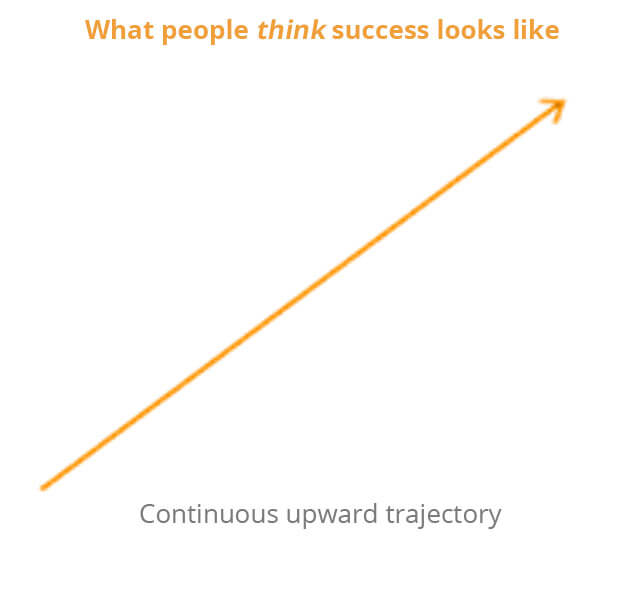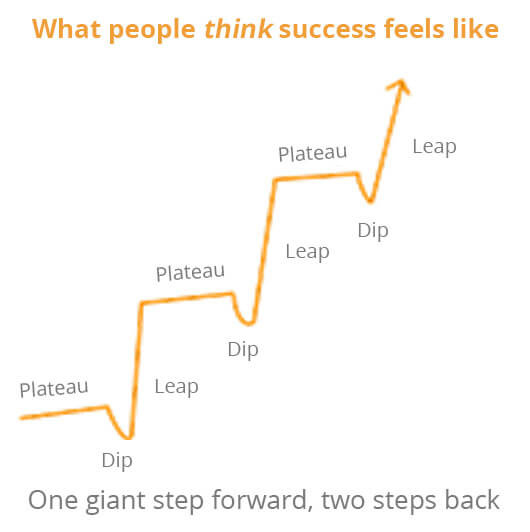Today there are plenty of examples of success being redefined outside traditional models. However, so many people still judge their own success by the linear model of success. In life you are taught that one’s progression through life is on some linear path. That there are progressive developmental phases that you are supposed to go through in life, starting with birth and ending with death. That after adolescence one’s success trajectory is to be positively correlated with becoming older, better educated, more experienced, etc. If you are not following those paths, then somehow you are off-track, not performing well, a problem that needs resolving.
Production by machine has led to a peculiar illusion that the road to excellence is straight and pleasant. Thinking in the industrialized world covets no failures and knows no excellence.
Erich Fromm Tweet
The Linear Illusion Of The Matrix
In a linear model you are failing if you are not in the right place in life, at the right time, with the right amount of success that external measures deem you should have. Subsequently, you are ahead of the game, if you are experiencing success before “you should be.” There lies the judgment that we constantly place upon ourselves; that we are not successful if we are not mapping according to the linear trajectory of success.
 Even if we account for a few setbacks or the “one step forward two steps back” model we typically place ourselves on an upward linear trajectory. The key is that in the linear model of success we feel good or bad about ourselves depending on where we are at on that upward trajectory, as if it even matters.
Even if we account for a few setbacks or the “one step forward two steps back” model we typically place ourselves on an upward linear trajectory. The key is that in the linear model of success we feel good or bad about ourselves depending on where we are at on that upward trajectory, as if it even matters.
The path of linear success in life is an illusion, if for no other reason than because much of what correlates success with age, developmental phases, and time is accounted for by all of the societal rules about who can do what at what time in life (e.g., play, compete, vote, work, lead, etc.). I am not saying that life does not follow the linear path for some or that there is no truth to the progression of developmental phases. What I am saying is that there are many myths that feed the illusion of the linear progression of life, from one step to the next. These myths warrant consideration and deep reflection, before we can allow ourselves to use that model to guide our personal development and evaluation of self.
The path of linear success in life is an illusion
Erich Fromm Tweet
Embracing Your Model Of Success

To the extent that your beliefs, values, goals, and model of success differ from the normative linear standard of success, begs the question of why you would use the outcomes and metrics of that model to measure your personal success? Consider the questions listed below. These are not easy questions to answer, but they are important to consider as you refine your model of success and map the milestones, outcomes, and metrics to your personal model.
- What is your personal model of success (e.g., if you just though I have no idea then now would be a good time to schedule a meeting with us)?
- On a scale of 1-10 (1= not at all, 5= somewhat, and 10 being very much so), to what extent do you feel that you are able to live into the model?
- What is the one thing that you would change to live more fully into your own model of success?
- On a scale of 1-10 (1= not at all, 5= somewhat, and 10 being very much so), to what extent are you comfortable with managing the expectations that others may have of you to perform at their definition of success?
Even if you have knowingly (or unknowingly) bought into someone else’s model then surely the success and failures of that model are theirs and not really yours. What does it matter to lose a race that you are not running? To win a game that you are not really trying to play? Even more important, is to not measure your success by someone else’s model.
Measure your success in accordance with their own life, beliefs and values. Truly, the key is to be true to thy self.
